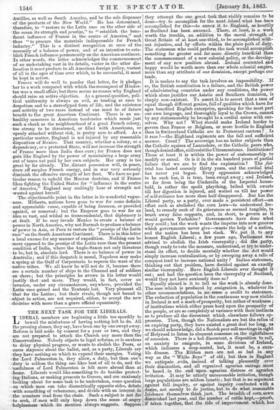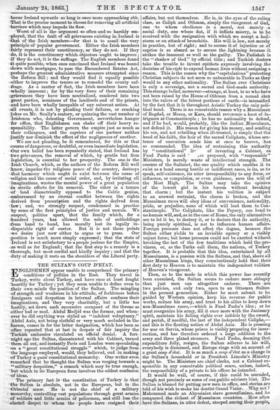THENEXT TASK FOR TILE LIBERALS. L IBERAL members are beginning a
little too speedily to bewail the misfortune of having nothing left to do. All the pressing abuses, they say, have been one by one swept away. Reform is laid aside by consent for a year or two, and they are not prepared to attack the Church any more than the Conservatives. Nobody objects to legal reforms, or is anxious to delay physical progress, or wants to abolish the Peers, or cares sixpence about the ballot, and, as a party, Liberals say they have nothing on which to expend their energies. Voting for Lord Palmerston is, they allow, a duty, but then one's duty is seldom the thing one likes beat of all to do, and the usefulness of Lord Palmerston is felt more abroad than at home. Liberals would like something to do besides protect- ing Italians, or making presents to Greece, and are anxiously looking about for some task to be undertaken, some question on which men can take diametrically opposite sides, debate with something of vehemence, and divide with an interest in the numbers read from the chair. Such a subject is not far to seek, if men will only keep down the sense of angry helplessness which its mention always suggests. Suppose they attempt the one great task that visibly remains to be done—try to accomplish for the next island what has been accomplished for this—to annex it to England, as heartily as Scotland has been annexed. There, at least, is a work worth the trouble, an addition to the moral strength of Great Britain of at least one-third, to be accomplished with- out injustice, and by efforts within the plain path of duty. The statesman who could perform the task would accomplish something far greater and far more directly beneficial than the commencement of a new colonial policy, or the develop- ment of any new position abroad. Ireland contented and happy would be worth more than our whole colonial empire, more than any attribute of our dominion, except perhaps our trade.
It is useless to say the task involves an impossibility. If so, the British constitution is a failure, and the British power of administering countries under any conditions, the power which alone justifies our Asiatic and Southern dominion, is simply non-existent. To assert it is to assert that a race of equal though different genius, full of qualities which have for ages benefited English enterprise, speaking for the most part our own language and thoroughly loyal to the Crown, cannot by any statesmanship be bmught to a cordial union with our- selves. Why not ? What should make Ireland harder to govern than France or Belgium, or more hostile to England than in Switzerland Catholic are to Protestant cantons ? Is it race ?—the Highland regiments are the full and sufficient answer. Creed ? The sovereign has no better subjects than the Catholic squires of Lancashire, or the Catholic peers who, though denied office, stillresistthe 111iltramoutanes. Institutions? Those at least it is within the power of statesmanship to modify or annul. Or is it in the six hundred years of partial failure that we are to find the explanation ? The fair trial has lasted scarcely thirty years, and the cordial trial has never yet begun. Every oppression acknowledged to be such has it is true, been swept away ; and Ireland, so far from being the Cinderella of the Imperial house- hold, is rather the spoilt plaything, bribed with sweets till her digestion is injured, and waited on till her power of self-reliance has more than half disappeared. But has the Liberal party, as a party, ever made a persistent effort—an effort such as abolished the corn laws—to understand Ire- land, to remedy such of its grievances as seemed tangible, to brush away false supports, and, in short, to govern as it would govern Yorkshire ? Governments have done what they could ; but the work wants the impetus into new grooves which governments never give—wants the help of a nation, and the nation has been but slack. We put it to any honest English Liberal ; a few years ago, Parliament was advised to abolish the Irish viceroyalty ; did the party, though ready to vote the measure understand, or try to under- stand its effect, to decide mentally whether the Act would simply increase centralization, or by sweeping away a relic of conquest tend to increase national unity ? Italian statesmen, thinking out that problem, have decided against an exactly similar viceroyalty. Have English Liberals ever thought it out; and had the question been the viceroyalty of Scotland, would they not have anxiously done so ?
Equally absurd is it to tell us the work is already done. The ease which is produced by emigration is, whatever its other recommendations, in no sense a credit to statesmen. The reduction of population in the continuous way now visible in Ireland is not a mark of prosperity, but rather of weakness ; of institutions which either press hard upon the prosperity of the people, or are so completely at variance with their instincts as to produce all the discontent which elsewhere follows op- pression. Then, though the Nationalists are but the relics of an expiring party, they have existed a great deal too long, as we should acknowledge did a Scotch peer call meetings in sight of Holyrood to listen to eloquent nonsense on the rightfulness of secession. There is a hot discontent, a disposition to rail, an anxiety to emigrate, in some divisions of Ireland, which indicates a deep-seated, but, it must be, a cura- ble disease. The Ribbon men are not so bad in any way as the "White Boys" of old ; but then in England we extirpate evils, instead of talking pleasantly over their diminution, and all organized agrarian outrage must be based in the end upon agrarian distress or agrarian irritation. It may be utterly unreasonable irritation, though large populations are seldom lunatic ; but that is no argument against full inquiry, or against inquiry conducted with a desire, not merely to do justice, but to do what reasonable Irishmen themselves think just. The breadth of corn sown diminished last year, and the number of cattle kept,—proofs, if taken together, Lila the tide of improvement which has borne Ireland upwards so long is once more approaching ebb. 'That is the precise moment to choose for removing all artificial barriers which may impede its flow.
Worst of all is the argument so often and so harshly em- ployed, that the fault of all grievances existing in Ireland is that of the Irish members—for that is to asseil the -eery principle of popular government. Either the Irish members fairly represent their constituency, or they do not. If they .do, it is the constituency which objectors ought to improve ; if they do not, it is the suffrage. The English members found it quite possible, when once convinced that Ireland was bound down with mortgages, to pass the Encumbered Estates Act, perhaps the greatest administrative measure attempted since the Reform Bill ; and they would find it equally possible either to improve the tenure or to remodel the county suf- frage. As a matter of fact, the Irish members have been wholly innocent ; for by the very force of their remaining :grievances they have been neutralized, sundered into two great parties, nominees of the landlords and of the priests, and have been wholly incapable of any coherent action. At all events, it is not by pleading their failures, or cracking jokes on Mr. Scully's oratory, or quizzing the vast number of Irishmen who, detesting Government, nevertheless hunger for office, that Englishmen can shake off their heavy re- sponsibility. The latter govern the empire just as much as their colleagues, and the caprices of one partner neither justify nor diminish the effect of the negligences of another. We are not pleading, be it remembered, for this or that .course of dangerous, or doubtful, or even immediate legislation. Our own belief has been repeatedly stated, that Ireland has two grievances, the removal of which, by gentle but firm legislation, is essential to her prosperity. The one is the Irish Church, which, as the authors of the Reform Bill well • know, impedes the -religious peace of the country, destroys that harmony which ought to exist between the cause of *religion and the cause of social order, and, by irritating all imaginations, wastes the mental power of a great population in sterile efforts for its removal. The other is a tenure of land diametrically opposed to the Celtic genius, —embarrassed by an eternal conflict between the rights derived from prescription and the rights derived from law ; and, we strongly suspect, condemned in practice by some of the first principles of justice and morals. We suspect, politics apart, that the family which, for a liundred years, has allowed the sale of subholdings from hand to hand, has morally lost its legally in- disputable right of ouster. But it is not these points we desire just now either to argue or to press. Our position is much more simply expressed; that the state of Ireland is not satisfactory to a people jealous for the Empire, as 'well as for England; that the first step to a remedy is a thorough, but most cordial and kindly inquiry ; and that the duty of making it rests on the shoulders of the Liberal party.































 Previous page
Previous page